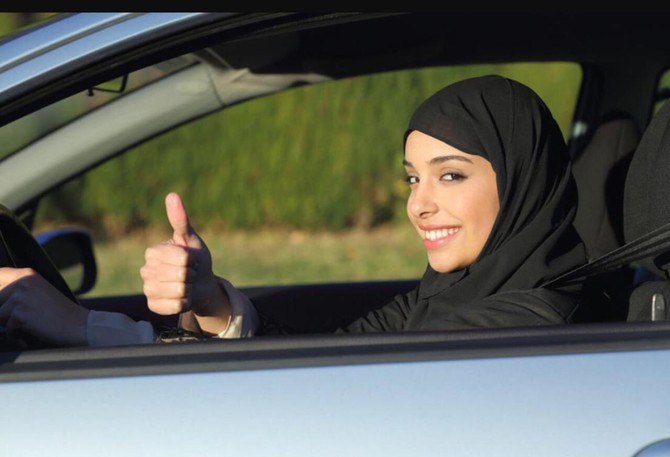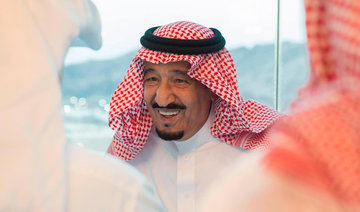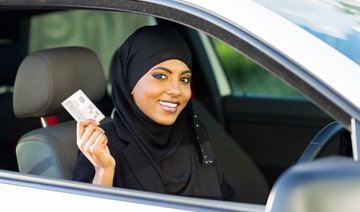JEDDAH: Saudis took to social media in their droves on Tuesday night to welcome King Salman’s historic decree allowing women to drive.
Trending Arabic hashtags launched just a few seconds after the announcement included #KingBacksWomenDrive and #WomenDrive.
The milestone was greeted with jubilation on social media, with the hashtag #SaudiWomenCanDrive.
“Congratulations to Saudi women and men. Finally the ban on driving is lifted and soon women will be further enabled on the way to self-determination,” said Aiyah Saihati. “This issue is more than the sum of its parts. It is about unclogging a major social and economic artery that will significantly impact the country’s dynamism.”
My public statement.
Congratulations and well done.#الملك_ينتصر_لقيادة_المرأة #SaudiWomenCanDrive pic.twitter.com/fZgIvWYElI— YOUTH POWER (@Aiyah1) September 26, 2017
She said she was delighted this collective aspiration has finally been realized.
“I’m so beyond happy Saudi Arabia is allowing women to drive. Everyone gets a carrr!,” one tweet said, sharing a famous GIF of the queen of talk shows, Oprah Winfrey.
I’m so BEYOND HAPPY SAUDI ARABIA IS ALLOWING WOMEN TO DRIVE
YOU GET A CAR YOU GET A CAR
EVERYONE GETS A CARRR! #الملك_ينتصر_لقياده_المراه pic.twitter.com/mxBTZGdOyl— فيكتوريا♡ (@victoriama20) September 26, 2017
Expatriates in Saudi Arabia joined enthusiastically in the online debate. “I’m literally shocked. I’ve been here my whole life This is a whole new era!” one Twitter user said.
I'm literally shocked is this Saudi????
I've been here my whole life THIS IS A WHOLE NEW ERA!!#الملك_ينتصر_لقيادة_المراة— A girl has no name (@M_Alshanfari) September 26, 2017
Men also rejoiced and called the royal decree “a historic decision” and “a great triumph for Saudi females.”
Others cheered at the news while demanding the ban on cinemas be lifted as well.
Meanwhile, Saudis proved once again that humor is an essential part of their existence as memes and jokes flooded the trending hashtag.
“I’m gonna crash my ex’s car,” one woman joked, while another shared a screenshot deleting the cab-hailing apps Careem and Uber.
#الملك_ينتصر_لقياده_المراه
Mood: pic.twitter.com/RkE6NtYSF4— Alaa. (@ALAA__ADEL) September 26, 2017
A meme of women riding bumper cars was captioned: “Dreams come true,” with a line that read: “Started from the bottom … now we are here.”
Dreams come true #الملك_ينتصر_لقياده_المراه pic.twitter.com/fG2qnmGHxQ
— Nothing. (@iwxui1) September 26, 2017
Some complained about predicted traffic jams once the decision comes into effect. Others argued that traffic would not increase because most families would terminate their drivers’ services once their daughters start driving.
Others chose the voice of reason and called for the various parties to calm down and respect each other’s opinions.
Salman Al-Dosary, a writer with the pan-Arab daily Asharq Al-Awsat, said: “It’s your right to disagree with the decision, but it’s not your right to disrespect those who disagree with you. Don’t confiscate others’ opinions.”
من حقك التحفظ على قرار قيادة المرأة
لكن ليس من حقك أبدا عدم احترام من يختلفون معك
لا تصادر رأي الآخرين وتقدس رأيك#الملك_ينتصر_لقيادة_المراة— سلمان الدوسري (@SalmanAldosary) September 26, 2017
The moderate side suggested if families would not allow their women to drive, at least they should employ a female driver to put the family’s mind at rest.
Prominent Gulf figures also shared their opinions.
أخبارالسعودية المفرحة تتوالى في كل المجالات،وإنجازاتها تراكم خيّر في مسيرة مباركة يقودها الملك سلمان،حفظه الله،بثقة ورؤية إيجابية،ألف مبروك.
— د. أنور قرقاش (@AnwarGargash) September 26, 2017
“Saudi Arabia’s joyous news continues to flood in all fields, and its achievements accumulate well in a blessed step led by King Salman with confidence and a positive vision, congratulations,” tweeted Anwar Gargash, the UAE’s Minister of State for Foreign Affairs
Mood: #الملك_ينتصر_لقياده_المراه pic.twitter.com/KvMdUfzhkI
— ليلى (@lia1h1) September 26, 2017


























